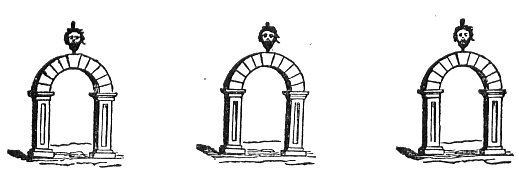The ties of Society teach us to love one another. That is a miserable society, where the absence of affectionate kindness is sought to be supplied by punctilious decorum, graceful urbanity, and polished insincerity; where ambition, jealousy, and distrust rule, in place of simplicity, confidence, and kindness.
So, too, the social state teaches modesty and gentleness; and from neglect, and notice unworthily bestowed on others, and injustice, and the world’s failure to appreciate us, we learn patience and quietness, to be superior to society’s opinion, not cynical and bitter, but gentle, candid, and affectionate still.
Death is the great Teacher, stern, cold, inexorable, irresistible; whom the collected might of the world cannot stay or ward off. The breath, that parting from the lips of King or beggar, scarcely stirs the hushed air, cannot be bought. or brought back for a moment, with the wealth of Empires. What a lesson is this, teaching our frailty and feebleness, and an Infinite Power beyond us! It is a fearful lesson, that never becomes familiar. It walks through the earth in dread mystery, and lays it hands upon all. It is a universal lesson, that is read everywhere and by all men. Its message comes every year and every day. The past years are crowded with its sad and solemn mementoes; and death’s finger races its handwriting upon the walls of every human habitation.
p. 184
It teaches us Duty; to act our part well; to fulfill the work assigned us. When one is dying, and after he is dead, there is but one question: Has he lived well? There is no evil in death but that which life makes.
There are hard lessons in the school of God’s Providence; and yet the school of life is carefully adjusted, in all its arrangements and tasks, to man’s powers and passions. There is no extravagance in its teachings; nor is anything done for the sake of present effect. The whole course of human life is a conflict with difficulties; and, if rightly conducted, a progress in improvement. It is never too late for man to learn. Not part only, but the whole, of life is a school. There never comes a time, even amidst the decays of age, when it is fit to lay aside the eagerness of acquisition, or the cheerfulness of endeavor. Man walks, all through the course of life, in patience and strife, and sometimes in darkness; for, from patience is to come perfection; from strife, triumph is to issue; from the cloud of darkness the lightning is to flash that shall open the way to eternity.
Let the Mason be faithful in the school of life, and to all its lessons! Let him not learn nothing, nor care not whether he learns or not. Let not the years pass over him, witnesses of only his sloth and indifference; or see him zealous to acquire everything but virtue. Nor let him labor only for himself; nor forget that the humblest man that lives is his brother, and hath a claim on his sympathies and kind offices; and that beneath the rough garments which labor wears may beat hearts as noble as throb under the stars of princes.
Nor are the other duties inculcated in this Degree of less importance. Truth, a Mason is early told, is a Divine attribute and the foundation of every virtue; and frankness, reliability, sincerity, straightforwardness, plain-dealing, are but different modes in which Truth develops itself. The dead, the absent, the innocent, and those that trust him, no Mason will deceive willingly. To all these he owes a nobler justice, in that they are the most certain trials of human Equity. Only the most abandoned of men, said
p. 185
[paragraph continues] Cicero, will deceive him, who would have remained uninjured if he had not trusted. All the noble deeds that have beat their marches through succeeding ages have proceeded from men of truth and genuine courage. The man who is always true is both virtuous and wise; and thus possesses the greatest guards of safety: for the law has not power to strike the virtuous; nor can fortune subvert the wise.

Moe is the founder of GnosticWarrior.com. He is a father, husband, author, martial arts black belt, and an expert in Gnosticism, the occult, and esotericism.






